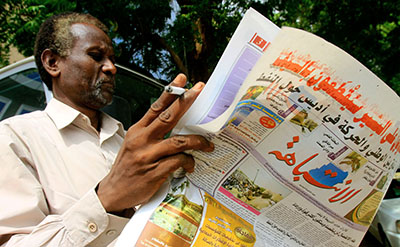New York, June 6, 2013–Sudanese authorities have banned the publication of at least three newspapers in the past two weeks despite statements by government officials to curtail censorship practices, according to news reports.
News accounts reported that the National Intelligence and Security Services (NISS) and the Sudanese information minister agreed last month to end pre-publication censorship, a tactic often employed by the security agency to censor news outlets in advance of publication. Two weeks ago, the vice-president ordered the end of the practice.
“The Sudanese government cannot have it both ways, offering to lift pre-publication censorship while at the same time reverting to its long-standing tactic of banning publications outright,” said CPJ Deputy Director Robert Mahoney. “Sudan should immediately stop all forms of censorship and allow all banned newspapers to resume its operations.”
Madiha Abdella, editor-in-chief of the opposition paper Al-Midan, said on Sunday that the NISS had told the staff that it had ordered the paper’s printing and distribution companies to halt operations, according to news reports. The paper will continue to publish online, the reports said.
Al-Midan, which is the Communist Party’s official newspaper, had resumed publication after the vice-president’s recent announcement. The paper had been banned from publishing in early 2012 in connection with its critical coverage of the government, news reports said. The paper has published online throughout.
The NISS on May 24 also banned two prominent Arabic-language dailies, Al-Meghar al-Syasy and Al-Intibaha, according to news reports. Reuters reported that Al-Meghar al-Syasy was banned after it criticized calls for President Omar al-Bashir to seek re-election in 2015. Al-Intibaha was banned for reporting on the military’s clashes with rebel groups in South Kurdofan, on the South Sudan border. Reuters said Al-Intibaha resumed publication on May 31. It is not clear if Al-Meghar has resumed publishing, but its website has not been updated since the ban.
- For more data and analysis on Sudan, visit CPJ’s Sudan page here.
